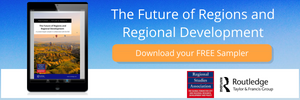Date and time
We are living through a period of profound change. Fundamental shifts occurring economically (increasing leadership in Asia, new opportunities in Africa, raising connectivity through global investment flows), demographically (aging populations, migration), politically (resurgent secession movements, isolationism and protectionism), democratically (unexpected electoral outcomes), technologically (Industry 4.0, ‘big data’), environmentally (smart urbanism), and socially (raising inequalities, security concerns) all have important implications for cities and regions. In times of growing uncertainty and instability, regional research is vital to inform public debates and invoke appropriate policy responses. Indeed, regional research can once more be seen spearheading major efforts to provide the type of reliable, robust knowledge necessary to correct the opening up of gaps between people and places which are emerging as winners and losers from these processes. But the stakes have never been higher, and with more major changes on the horizon – e.g. Brexit, post-2020 EU Budget – there is an urgent need to examine how they will impact the futures of cities and regions, and equally important, the nature of regional research in the years ahead.
The Regional Studies Association Winter Conference 2018 presents a timely opportunity to discuss and debate these important issues, to establish the need and nature of future research imperatives in the field, and to address the concerns and challenges confronting practitioners and policymakers. The focus on ‘horizons’ is an invitation to step outside the narrow confines of existing debate to address issues of profound relevance, significance and importance to the rapidly changing urban and regional world(s) in which we live and work. The conference organisers are keen to attract papers and sessions which extend our urban and regional horizons by identifying new fields of enquiry, which address a broad research and policy agenda, and including contributions from any discipline which can offer relevant insights at local and regional levels. Papers which are highly innovative, collaborative, international or multi-disciplinary are especially welcome.
Broad themes and key shifts the organisers are keen to facilitate discussion around include, but are not limited to:
- Post-2020 EU Budget, the future of EU Policies and their likely implications for cities and regions
- Energy transitions, environmental sustainability, and designing urban and regional futures
- Industry 4.0 and the future shape of innovation, industrial development and strategy
- New Financial Instruments for city and regional development
- Brexit geographies and the future for investment, trading relations and their regional impacts
- The future of city and regional planning, governance and devolution
- Stress-testing new and established concepts, theories, frameworks, methods, vocabularies for understanding regional change and development
- The role of universities and other institutions in shaping places and their futures
- Tools and techniques for extending our horizons through comparative regionalism
- Global investment flows, Global Value Chains and global connectivity: their geography and spatial impacts
- Global migration flows and the integration of migrants into cities regions: challenges and opportunities for economic development
- Technological change, innovation and its implications for cities and regions

To tie in with the RSA Winter conference theme 2018 ‘New Horizons for Cities and Regions in a Changing World’ Routledge have put together this FREE chapter sampler which includes extracts from books in the RSA book series, Regions and Cities.